
The last two years have been difficult for everyone due to the Covid 19 pandemic. Now that things have improved, most countries have lifted the domestic and international ban on flights. Even though things are getting better than before, the pandemic is not over yet! Thus, it’s essential to take precautions to protect yourself, follow this Checklist for Flying during pandemic and reduce the chance of spreading the virus.
Table of Contents
Checklist for Flying – COVID 19 restrictions at your travel destination
 While flying during the pandemic, check the Covid 19 guidelines issued by the country/state you are travelling to. Different countries and states have other criteria. While travelling, you are required to be vaccinated. Some only need an initial dose of vaccine, though. In some countries, a 14-day quarantine is necessary whether you are vaccinated or not, so it’s advised to make plans. Keep in mind that these restrictions and guidelines change depending on the local situation.
While flying during the pandemic, check the Covid 19 guidelines issued by the country/state you are travelling to. Different countries and states have other criteria. While travelling, you are required to be vaccinated. Some only need an initial dose of vaccine, though. In some countries, a 14-day quarantine is necessary whether you are vaccinated or not, so it’s advised to make plans. Keep in mind that these restrictions and guidelines change depending on the local situation.
Vaccination certificate
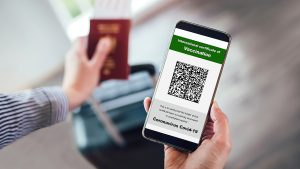 Along with other documents, a vaccination certificate is also necessary.
Along with other documents, a vaccination certificate is also necessary.
According to most destination guidelines, though it is not mandatory for travelling in every country, it’s still preferred in a few places. For instance, a vaccination certificate may be essential for local activities. Additionally, you must ensure that the certificate is valid in the destination country. If not, either you won’t be able to travel there, or you’ll have to get quarantined for the required period. Vaccination can change these requirements in many countries, so stay informed.
Masks
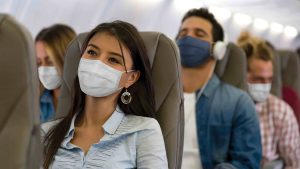 Masks have become an inevitable part of our lives, and for personal safety, it’s essential to wear them. The mask should completely cover your nose and mouth. If you wear glasses that turn foggy due to the mask, you can use special tape to seal the gap. It’s advised to pack extra ones, so you can always wear a new one if one gets dirty, wet, or misplaced. It’s also important to change/wash your mask daily to get rid of dirt, odour, and germs.
Masks have become an inevitable part of our lives, and for personal safety, it’s essential to wear them. The mask should completely cover your nose and mouth. If you wear glasses that turn foggy due to the mask, you can use special tape to seal the gap. It’s advised to pack extra ones, so you can always wear a new one if one gets dirty, wet, or misplaced. It’s also important to change/wash your mask daily to get rid of dirt, odour, and germs.
Covid 19 test
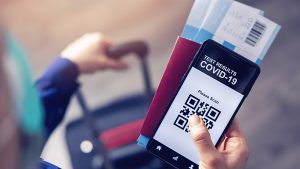 A Covid 19 test is mandatory to travel to most countries, whether you are vaccinated or not. Therefore, it is essential to take a Covid 19 test before travelling for your well-being and others around you. Even if the test is not mandatory for your travel destination, it’s better to take it before and after arrival to reduce the virus’s possible spread.
A Covid 19 test is mandatory to travel to most countries, whether you are vaccinated or not. Therefore, it is essential to take a Covid 19 test before travelling for your well-being and others around you. Even if the test is not mandatory for your travel destination, it’s better to take it before and after arrival to reduce the virus’s possible spread.
Hand soap and sanitiser
 Hand soaps, sanitisers, and wipes are the necessities while travelling during this pandemic. It’s important to wash hands or sanitize them from time to time to avoid getting infected with the virus. It’s convenient to use hand soap and sanitisers to clean your hands after touching something.
Hand soaps, sanitisers, and wipes are the necessities while travelling during this pandemic. It’s important to wash hands or sanitize them from time to time to avoid getting infected with the virus. It’s convenient to use hand soap and sanitisers to clean your hands after touching something.
Disinfectant wipes
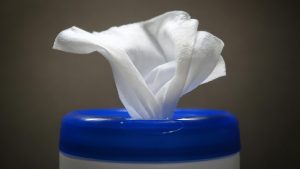 While travelling, disinfectant wipes are essential, especially at the airport. An airport is a busy place with many people travelling from around the world. It means everything may be contaminated. It could be the bench/chair you are sitting on, the railing of the stairs, the check-in counter at the terminal, even your luggage after you’ve reached the destination. It would help if you also wiped your phone clean from time to time to avoid catching any possible infection.
While travelling, disinfectant wipes are essential, especially at the airport. An airport is a busy place with many people travelling from around the world. It means everything may be contaminated. It could be the bench/chair you are sitting on, the railing of the stairs, the check-in counter at the terminal, even your luggage after you’ve reached the destination. It would help if you also wiped your phone clean from time to time to avoid catching any possible infection.
Storage bags
 Keep a handbag to keep the essential items near and easy to reach. Also, some extra storage bags so you can store dirty masks or keep used wipes, tissues, or any other things you used. Also, make sure that your handbag or storage bag is completely compact or closed and away from other people’s breath or touch.
Keep a handbag to keep the essential items near and easy to reach. Also, some extra storage bags so you can store dirty masks or keep used wipes, tissues, or any other things you used. Also, make sure that your handbag or storage bag is completely compact or closed and away from other people’s breath or touch.
Travel insurance
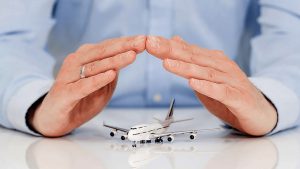 Travel insurance is not mandatory to travel to most countries, but it is still important. It would be best to buy insurance covering almost every aspect, such as theft, robbery, and medical emergencies. Medical emergencies such as Covid 19 will be covered in the insurance, as one may be hospitalized if it’s serious. And healthcare services are quite costly in most countries.
Travel insurance is not mandatory to travel to most countries, but it is still important. It would be best to buy insurance covering almost every aspect, such as theft, robbery, and medical emergencies. Medical emergencies such as Covid 19 will be covered in the insurance, as one may be hospitalized if it’s serious. And healthcare services are quite costly in most countries.
Limit your food and drink intake
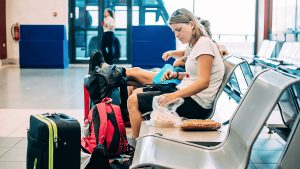 Food can be the leading carrier of viruses in your body. It’s better to take little food and beverages on the plane or at the airport. You cannot avoid eating during long flights, but you can do it during domestic flights. Moreover, eating and drinking will make you use the restroom, which may increase the chance of getting infected with the virus.
Food can be the leading carrier of viruses in your body. It’s better to take little food and beverages on the plane or at the airport. You cannot avoid eating during long flights, but you can do it during domestic flights. Moreover, eating and drinking will make you use the restroom, which may increase the chance of getting infected with the virus.
Visit Aertrip provides you with all the information you want to know about your travel destination, flight schedules, best hotels, or planning & organizing your travel.
